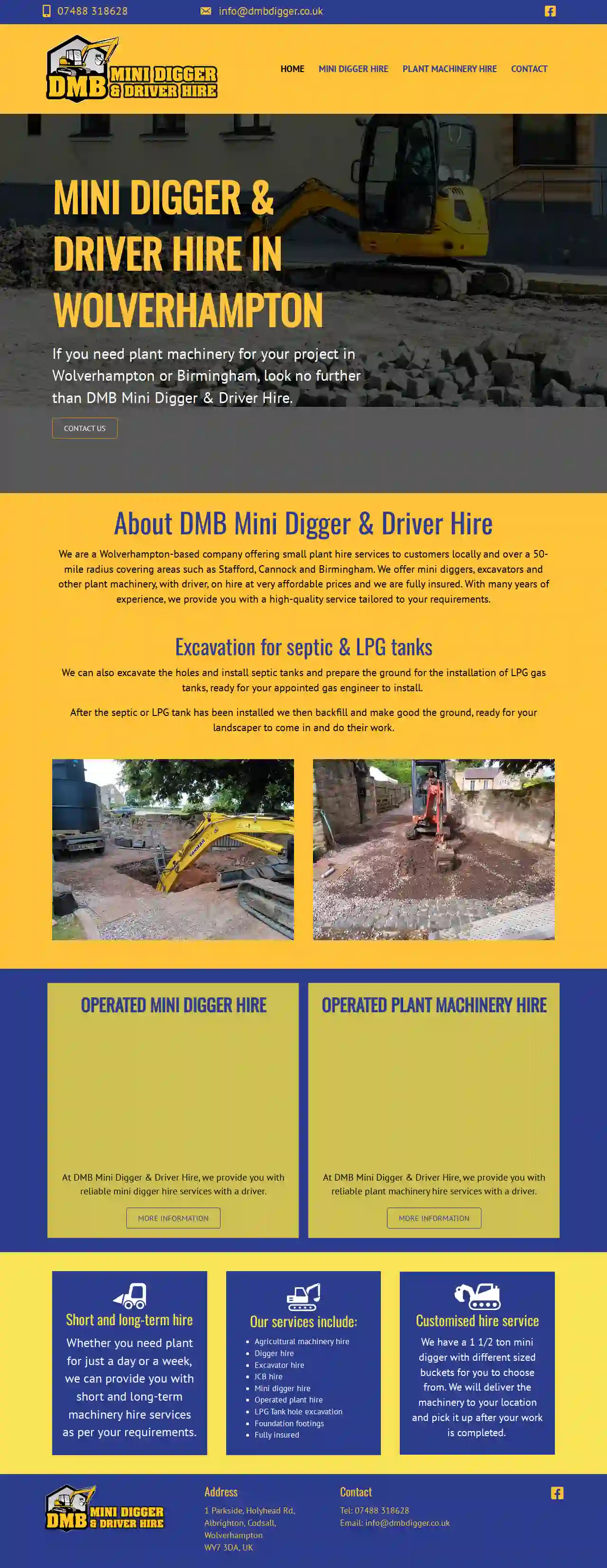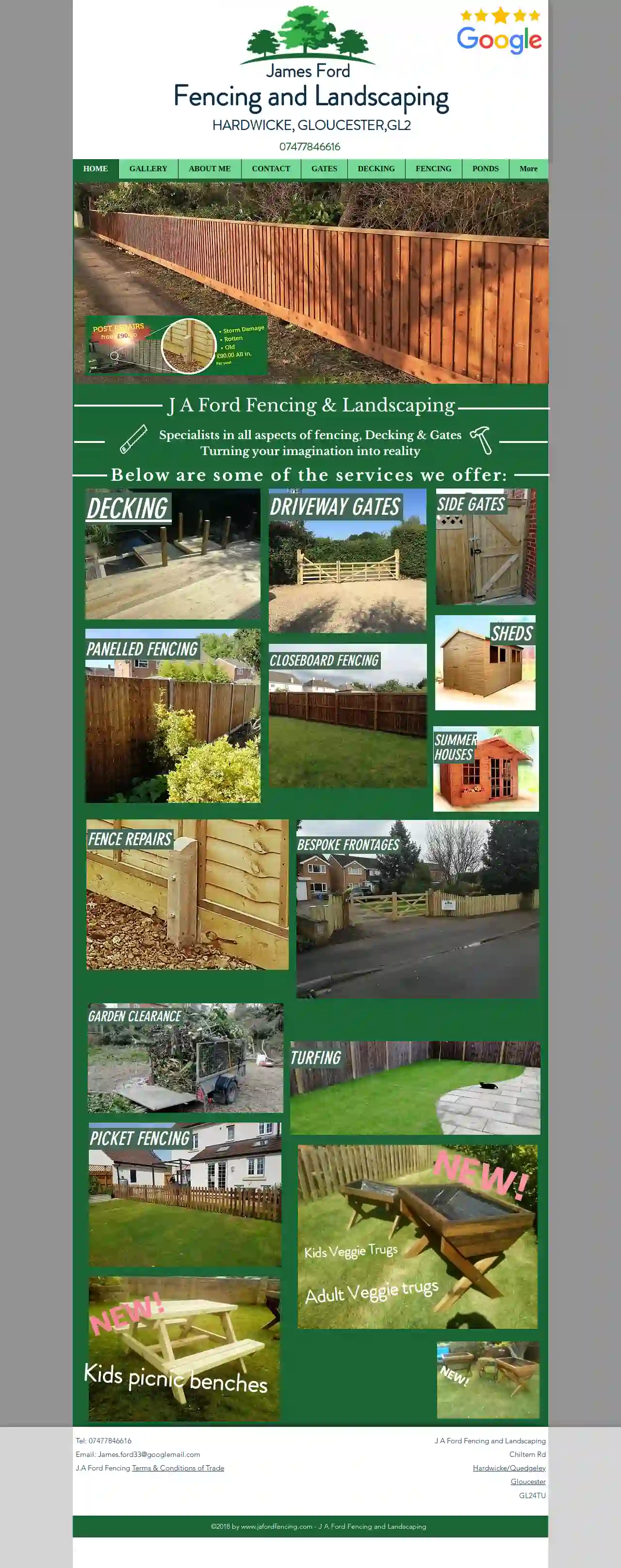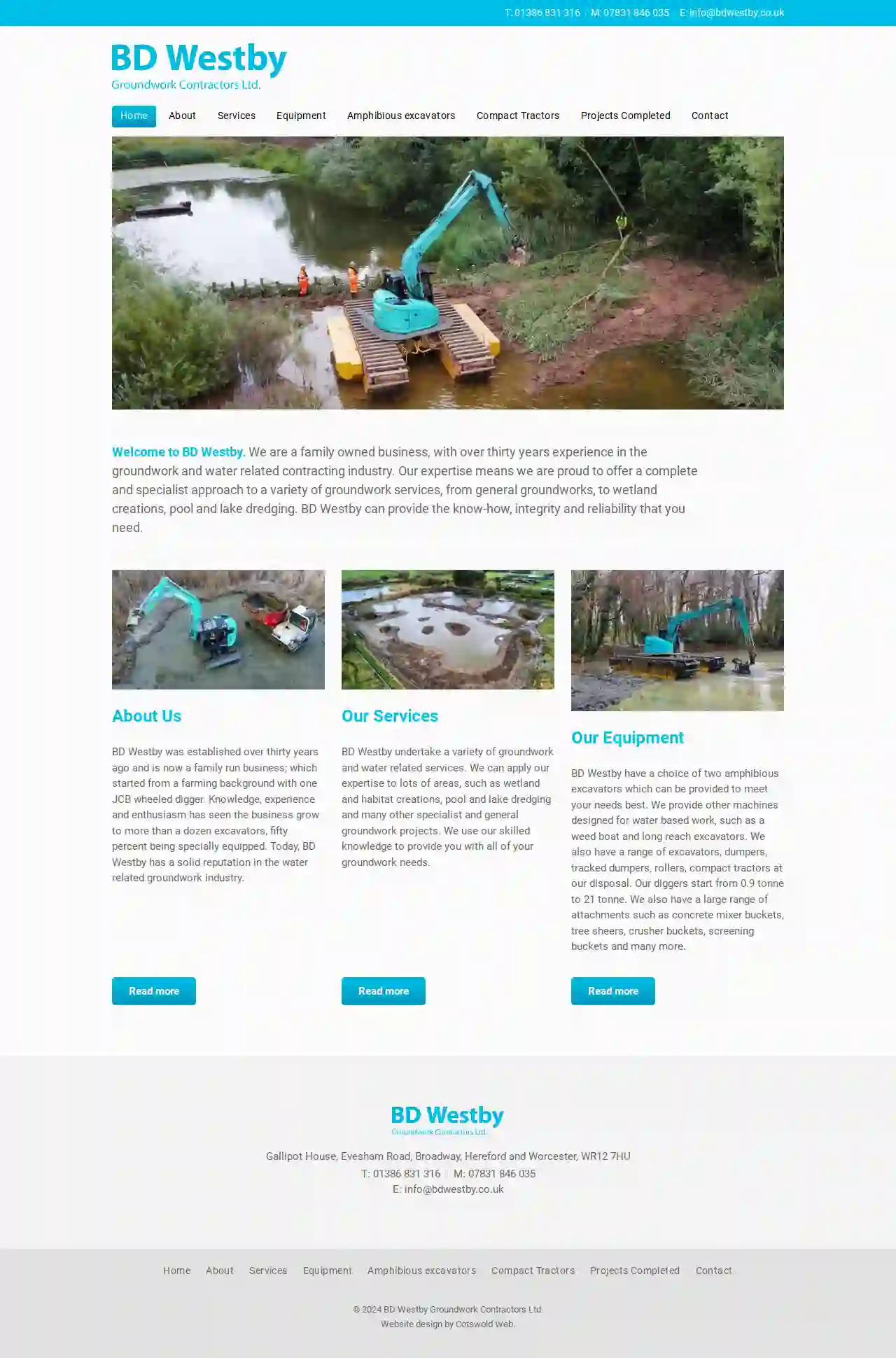Excavation Contractors Ludlow
Find Excavating Contractors in Ludlow
Get multiple Excavation Contractor quotes for your project today! Compare profiles, reviews, accreditations, portfolio, etc... and choose the best offer.

LOPES EXCAVATION AND HARDSCAPE INC
97 Hartford Ave East, Mendon, 01756, GBAbout Us Lopes Excavation and Hardscape Inc. is a family-owned and operated business serving the Mendon, MA area. We are committed to providing our clients with high-quality services at competitive prices. We have a team of experienced professionals who are dedicated to providing you with the best possible service. We are fully licensed and insured, and we are committed to safety and quality in all of our work. We are proud to serve our community and we are committed to providing our clients with the best possible experience. We offer a wide range of services, including: Excavation Site Work Demolition Foundations Drains Septic Systems Hardscape Hammering and Ledge Removal We are committed to providing our clients with the best possible service. We are fully licensed and insured, and we are committed to safety and quality in all of our work. We are proud to serve our community and we are committed to providing our clients with the best possible experience.
- Services
- Why Us?
- Gallery
Get Quote
D C Building Developments Ltd
52 reviews35 Hawthorn Lane, Malvern Worcestershire, 35 Hawthorn Lane Malvern Worcestershire, Malvern, WR14 3LA, GBAbout D C Building Developments Ltd D C Building Developments Ltd are high-quality contractors specializing in the construction of new buildings, extensions, alterations, repairs, and any general building requirements, both residential and commercial, in and around the Malvern area. With over 30 years of experience in the construction industry, our portfolio showcases the wealth of knowledge, skills, and experience we bring to every project. Established in 1986 by David Cale, we are committed to delivering exceptional results. Our team of qualified and highly skilled craftsmen and bonafide subcontractors take immense pride in their work and customer satisfaction. We are approved contractors for Worcestershire County Council and the Federation of Master Builders (FMB), ensuring adherence to the highest industry standards. We can arrange for the services of Architects and Structural Engineers if required. We are happy to provide any of our customers with a Joint Contracts Tribunal (JCT) Contract. For references, please contact us, view previous and current projects, or speak with our clients. We are a company registered in England and Wales with company number 8176609. Our VAT Number is 142 3486 24.
- Services
- Why Us?
- Testimonials
- Gallery
Get Quote- P.
P.Edwards Brickwork & Construction
53 reviewsGloucester, GBAbout P.R. Edwards Construction P.R. Edwards Construction is a family-owned and operated business with over 20 years of experience in the construction industry. We are committed to providing our clients with high-quality workmanship and exceptional customer service. We specialize in a wide range of construction services, including new home construction, renovations, additions, and commercial projects. Our team of experienced professionals is dedicated to delivering projects on time and within budget. We take pride in our attention to detail and our commitment to exceeding our clients' expectations. We understand that building or renovating your home is a significant investment. That's why we work closely with our clients to ensure that their vision is brought to life. We offer a personalized approach to every project, taking the time to listen to our clients' needs and preferences. We are also committed to using sustainable building practices whenever possible. If you are looking for a reliable and experienced construction company, look no further than P.R. Edwards Construction. Contact us today for a free consultation.
- Services
- Why Us?
Get Quote 
GeMech Foundations Ltd
45 reviewsUnit 12 Kenn Court, South Bristol Business Park, Roman Farm Rd, Bristol, BS4 1UL, GBSPECIALIST PILING & GROUND SOLUTIONS WHERE DESIGN AND COSTS ARE PROFESSIONALLY MANAGED GeMech own and maintain a diverse fleet of specialist plant. Providing detailed tender stage design, allowing the most economic pile solution and cost effectiveness. GeMech offer a wide variety of piling and ground improvement options to best suit your project. GeMech offer a full range of founding and piling solutions, including bored piling, percussively drilled piling, CFA piling , SFA piling and driven piling, piled retaining walls, vibro stone piled columns and dynamic compaction.
- Services
- Why Us?
- Testimonials
- Gallery
Get Quote
JH Construction and Groundworks
57 reviews12 Lansdowne Close, Malvern, Worcester, WR14 2AU, GBAbout JH Construction JH Construction is a family-run building and construction company based in the three counties and serving domestic and commercial clients in Malvern, Worcester and the surrounding areas. We've been in business for over 25 years, first established in 1994. Our main goal, then and now, is complete customer satisfaction. We offer a complete groundworks and construction service for your project from start to finish. We work closely with our customers to ensure their expectations are met to the highest quality and standards. Our team of highly skilled tradesmen are reliable and work to extremely high standards. What started as a basic groundworks company has now evolved into a complete construction company since being passed on from father to son. John has excelled in his qualifications, resulting in a number of diplomas. Alongside his vast knowledge and experience in this sector, JH Construction can cater for projects of all shapes and sizes.
- Services
- Why Us?
- Testimonials
- Gallery
Get Quote
Oracle Construction
1000 Worcester Rd, Framingham, 01776, GBOracle Construction has been specializing in general, commercial excavation and sitework. We strive to complete projects on time with a focus on customer satisfaction and employee retention. We are able to bid and handle small to large projects based upon scope of work, complexity and schedule. We are fully insured with general liability and worker's compensation and are available to meet with you in your office or job site to discuss your projects specific needs. Oracle Construction is an industry leader in delivering reliable, premier property maintenance services throughout Massachusetts & Rhode Island. We offer services for all seasons, providing trusted care to all our clients. We’ll work with you to develop a property maintenance program to fit your needs and budget. We are a General Contracting firm, specializing in commercial and residential construction and facilities management services. Our mission is to provide our clients with a quality project, on time and within budget. We coordinate with our clients from the very conception of the project through completion. We work closely with our clients and Designers and Subcontractors based on our clients’ needs and vision. Our reputation has made us the contractor of choice in Massachusetts. Oracle Construction Company is based out of Metro West Massachusetts. We contract with private parties, commercial companies and government agencies. We are a licensed and insured general contractor that practices safe working practices while complying with demanding project time frames. We work hard to earn your trust and ultimately we want to grow with you as “Your Partner From the Ground Up.”
- Services
- Why Us?
- Gallery
Get Quote
DMB diggers
4.714 reviews1 Parkside, Holyhead Rd, Albrighton, Codsall, Wolverhampton, WolverhamptonWV7 3DA, UK, WV7 3DA, GBAbout DMB Mini Digger & Driver Hire We are a Wolverhampton-based company offering small plant hire services to customers locally and over a 50-mile radius covering areas such as Stafford, Cannock and Birmingham. We offer mini diggers, excavators and other plant machinery, with driver, on hire at very affordable prices and we are fully insured. With many years of experience, we provide you with a high-quality service tailored to your requirements. We can also excavate the holes and install septic tanks and prepare the ground for the installation of LPG gas tanks, ready for your appointed gas engineer to install. After the septic or LPG tank has been installed we then backfill and make good the ground, ready for your landscaper to come in and do their work. Operated mini digger hire At DMB Mini Digger & Driver Hire, we provide you with reliable mini digger hire services with a driver. Operated plant machinery hire At DMB Mini Digger & Driver Hire, we provide you with reliable plant machinery hire services with a driver. Short and long-term hire Whether you need plant for just a day or a week, we can provide you with short and long-term machinery hire services as per your requirements. We have a 1 1/2 ton mini digger with different sized buckets for you to choose from. We will deliver the machinery to your location and pick it up after your work is completed.
- Services
- Why Us?
- Gallery
Get Quote
Harvey&Mendy construction
52 reviewsGloucester, GBWelcome to H&M Construction H&M Contractors have been in the building and construction trade for 5+ years, based in High Wycombe, servicing Buckinghamshire, Oxfordshire, Berkshire, Bedfordshire and Hertfordshire, with a wealth of experience in all areas of domestic construction including kitchens, bathrooms, extensions, loft conversions, landscaped gardens and driveways. Project details To find out more about the services we offer see our services page or visit our gallery to see a range of completed and in process projects. Are you interested in an estimate? GET A QUOTE
- Services
- Why Us?
- Testimonials
- Gallery
Get Quote
J A Ford Fencing and Landscaping
514 reviewsHardwicke/Quedgeley, Gloucester, Chiltern Rd, GL24TU, GBJames Ford Fencing and Landscaping Specialists in all aspects of fencing, Decking & Gates Turning your imagination into reality Services Offered We offer a wide range of services to meet your needs, including: SIDE GATES PANELLED FENCING CLOSEBOARD FENCING SHEDS SUMMER HOUSES DECKING DRIVEWAY GATES FENCE REPAIRS GARDEN CLEARANCE PICKET FENCING NEW! Kids picnic benches BESPOKE FRONTAGES TURFING Adult Veggie trugs Kids Veggie Trugs NEW!
- Services
- Why Us?
- Gallery
Get Quote
BD Westby Groundwork Contractors Ltd
Gallipot House, Evesham Road, Broadway, Hereford and Worcester, WR12 7HU, GBAbout BD Westby BD Westby is a family-owned business with over thirty years of experience in the groundwork and water-related contracting industry. We pride ourselves on offering a complete and specialist approach to a variety of groundwork services, from general groundworks to wetland creations, pool and lake dredging. BD Westby provides the know-how, integrity, and reliability you need. BD Westby was established over thirty years ago and is now a family-run business; which started from a farming background with one JCB wheeled digger. Knowledge, experience, and enthusiasm have seen the business grow to more than a dozen excavators, fifty percent being specially equipped. Today, BD Westby has a solid reputation in the water-related groundwork industry. With a wide range of rollers, dumpers, and attachments, our diggers start from 0.9 ton to 21 ton, with some being equipped with amphibious undercarriages, low ground pressure tracks, and tiltrotators, this provides us with the tools you need to get the job done. We only hire machinery with operators, meaning you get an assured and expert service wherever you are. BD Westby covers a large area, having completed projects all around the UK with operated plant or contracting services. We also specialize in the unusual – offering a truly groundbreaking groundwork service, no matter what.
- Services
- Why Us?
- Gallery
Get Quote
Over 13,059+ Excavation Pros registered
Our excavation experts operate in Ludlow & surroundings!
ExcavationHQ has curated and vetted the Best Excavation Pros arround Ludlow. Find a reliable pro today.
Frequently Asked Questions About Excavation Contractors
- Utility Locates: Contact your utility companies to mark the locations of underground lines before excavation begins. This is usually a free service.
- Hand Digging: Excavate carefully by hand near marked utility lines to avoid damage.
- Potholing: Digging small test holes to expose and verify utility depths and locations.
- Safe Distances: Maintaining a safe distance between excavation equipment and marked utility lines.
- Vacuum Excavation: Using vacuum excavation techniques to expose utilities without digging, reducing the risk of damage.
- Project Size and Scope: The larger and more complex the excavation, the higher the cost.
- Soil Type: Different soil types require different equipment and techniques, impacting costs. Rocky or clay-rich soil can be more expensive to excavate than loose soil.
- Accessibility: Difficult-to-access sites might require specialized equipment or additional labor, increasing expenses.
- Disposal Costs: Hauling away excavated material (soil, rocks, etc.) to disposal sites incurs additional fees.
- Permits and Inspections: Depending on local regulations, permits and inspections might be required, adding to the overall cost.
- Trench Collapses: Unstable trench walls can cave in, posing a severe risk to workers. Proper shoring and sloping are crucial safety measures.
- Utility Damage: Striking underground utilities (gas, water, electric) can cause leaks, explosions, or electrocution. Accurate utility locates and careful digging are essential.
- Falling Objects: Materials or equipment falling into excavations can injure workers. Securing work areas and using appropriate safety gear is vital.
- Equipment Accidents: Operating heavy machinery involves risks of rollovers, collisions, or mechanical failures. Trained operators and proper equipment maintenance are critical.
- Environmental Hazards: Excavated soil might contain hazardous materials (asbestos, lead). Proper testing and disposal procedures are necessary.
- Determining Soil Suitability: Assessing whether the soil can support the intended structure or load.
- Recommending Foundation Types: Advising on the appropriate foundation design based on soil characteristics.
- Addressing Drainage and Erosion Issues: Providing solutions to manage water runoff and prevent erosion.
- Evaluating Slope Stability: Assessing the risk of landslides or soil movement on slopes.
- Building on challenging soil types (expansive clay, loose sand, etc.)
- Constructing large or complex structures
- Excavating near slopes or retaining walls
- Addressing drainage or erosion concerns
How do you protect utilities during excavation?
How much does excavation cost?
What are the risks associated with excavation?
What is a soil engineer, and do I need one?
How do you protect utilities during excavation?
- Utility Locates: Contact your utility companies to mark the locations of underground lines before excavation begins. This is usually a free service.
- Hand Digging: Excavate carefully by hand near marked utility lines to avoid damage.
- Potholing: Digging small test holes to expose and verify utility depths and locations.
- Safe Distances: Maintaining a safe distance between excavation equipment and marked utility lines.
- Vacuum Excavation: Using vacuum excavation techniques to expose utilities without digging, reducing the risk of damage.
How much does excavation cost?
- Project Size and Scope: The larger and more complex the excavation, the higher the cost.
- Soil Type: Different soil types require different equipment and techniques, impacting costs. Rocky or clay-rich soil can be more expensive to excavate than loose soil.
- Accessibility: Difficult-to-access sites might require specialized equipment or additional labor, increasing expenses.
- Disposal Costs: Hauling away excavated material (soil, rocks, etc.) to disposal sites incurs additional fees.
- Permits and Inspections: Depending on local regulations, permits and inspections might be required, adding to the overall cost.
What are the risks associated with excavation?
- Trench Collapses: Unstable trench walls can cave in, posing a severe risk to workers. Proper shoring and sloping are crucial safety measures.
- Utility Damage: Striking underground utilities (gas, water, electric) can cause leaks, explosions, or electrocution. Accurate utility locates and careful digging are essential.
- Falling Objects: Materials or equipment falling into excavations can injure workers. Securing work areas and using appropriate safety gear is vital.
- Equipment Accidents: Operating heavy machinery involves risks of rollovers, collisions, or mechanical failures. Trained operators and proper equipment maintenance are critical.
- Environmental Hazards: Excavated soil might contain hazardous materials (asbestos, lead). Proper testing and disposal procedures are necessary.
What is a soil engineer, and do I need one?
- Determining Soil Suitability: Assessing whether the soil can support the intended structure or load.
- Recommending Foundation Types: Advising on the appropriate foundation design based on soil characteristics.
- Addressing Drainage and Erosion Issues: Providing solutions to manage water runoff and prevent erosion.
- Evaluating Slope Stability: Assessing the risk of landslides or soil movement on slopes.
- Building on challenging soil types (expansive clay, loose sand, etc.)
- Constructing large or complex structures
- Excavating near slopes or retaining walls
- Addressing drainage or erosion concerns